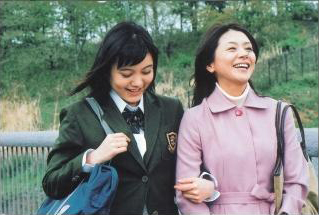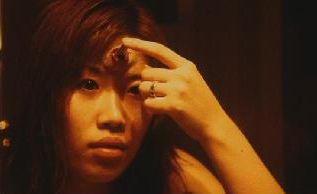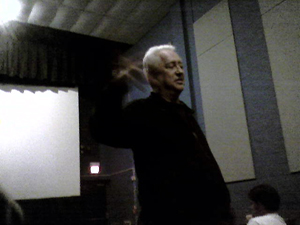Musings
an Online Journal of Sorts
By Alyce Wilson
April 3, 2006 - Strange Desires
I
liked this year's logo enough to buy
a T-shirt, even though I rarely
wear regular T-shirts
In the morning on Saturday, we took Luke to the vet because he'd had another allergic reaction. This time his nose had swollen up. The vet examined him and gave him a cortisone shot. She also felt his floppy belly and observed that he's getting chubby. We talked about ways to get him into shape. She suggested breaking his feedings into more times per day and giving him less overall. Also, we can play with him more to keep him active. Kitty fitness, here we go!
This weekend was the first of the 2006 Philadelphia Film Festival, and The Gryphon and I watched several movies.
We started on Saturday with a film called Hanging
Garden (Kûchû teien), directed by Toshiaki Toyoda,
who also directed Nine Souls,
a metaphysical prison break movie we saw at the festival last year. The
theater was packed to capacity.
 The
film was exquisite, beginning as a deceptively sweet family drama about
a cheerful, seemingly perfect family. As the film progresses, it becomes
apparent that they're all keeping secrets from one other and none of them,
not even the apparently Martha Stewart type mother is, indeed, perfect.
The
film was exquisite, beginning as a deceptively sweet family drama about
a cheerful, seemingly perfect family. As the film progresses, it becomes
apparent that they're all keeping secrets from one other and none of them,
not even the apparently Martha Stewart type mother is, indeed, perfect.
The film stars Kyôko Koizumi, who appeared in Survive Style 5+ and Itsuji Katsuji, who was in Nine Souls. The two are the parents of a dysfunctional family. Daughter Anne Suzuki also appeared in Nine Souls.
Toyoda uses a lot of subjective camera angles, with lots of sweeping side to side shots reminiscent of a pot in the family's hanging garden swinging. These shots become more prevalent as the family seems teetering towards disaster, as secrets start to emerge.
The symbolism is so rich in this movie that viewers could watch it several times and still pick up new things. One strong theme is that of Babylon, where people talk in different languages and none can understand each other. The family's apartment building resembles Medieval depictions of the Tower of Babylon, a building looking almost like a tiered wedding cake, with large balcony gardens.
The rich subtext consists of repeated images, visual motifs and dialogue, and Toyoda relies on the viewer to make connections. He succeeds to the degree that the viewer can often tell exactly what's motivating the characters in a scene, without dialogue being necessary.
Like Nine Souls, this movie focuses on the importance of redemption and of love, in this case familial love. In many ways, it's a stronger movie than his first, as the balance between humor and drama is more subtly interwoven. Unlike the teetering family it depicts, this is a well-balanced film.
We had a break before our next film. Since the first film showed at Ritz East, we stopped at the noodle restaurant next door and ordered takeout. I got the pineapple chicken and The Gryphon ordered a noodle dish. Then we hopped in the car and drove home so we could let Una out and check on Luke. He was doing fine and had even eaten. His appetite had been low since his allergic reaction became noticeable on Thursday.
Our next film was The Glamorous Life of Sachiko Hanai (Hanai Sachiko no karei na shougai) at the Bridge Theater. This movie was also packed.
 A
political sex film would be the best way to describe The Glamorous
Life. Young director Mitsuru Meike started with a typical Japanese
"pink film", or soft porn movie. After releasing an hour-long
version concentrating on the sex scenes, he expanded the movie into a
full-length feature, including plenty of political commentary.
A
political sex film would be the best way to describe The Glamorous
Life. Young director Mitsuru Meike started with a typical Japanese
"pink film", or soft porn movie. After releasing an hour-long
version concentrating on the sex scenes, he expanded the movie into a
full-length feature, including plenty of political commentary.
The film follows Sachiko Hanai, a prostitute whose fate changes when she's shot during a yakuza skirmish in a restaurant. What should have been a mortal head wound, however, instead opens a new world for Sachiko, releasing untapped potential and turning her into a genius.
As she stumbles, dazed and confused but intellectually curious, into the world, she engages in both sexual and conversational interactions with those she meets. Along the way, she happens across a political plot worthy of Cold War days, involving a mysterious silver tube she acquires on her way out of the restaurant.
Though there
were plenty of sex scenes, they weren't what most would consider erotic.
Instead, they're often humorous, as the actors engage in philosophical
and political debates. One running joke features a professor who is turned
on as much by her mind as her body. As he sheepishly admits to her, his
wife never discusses Noam Chomsky or Susan Sontag with him.
The film is clearly low budget, as evidenced by the uneven sound and the special effects which make Plan 9 from Outer Space look like a cinematic masterpiece. But the ideas were presumably more important to this neophyte director than the presentation.
Our last film of the evening was in The Cinema at Penn, which was only about a block away. As we stood in the lobby waiting to be let in, I listened to a group of festival goers who had also seen The Glamorous Life. One guy said it was completely awful. Another one said that he's seen at least three films at the festival in years past that were worse. He also had to give it props because the movie got he and his companions talking about ideas. Yet another woman in the group said it was entertaining but amateurish, which was a good way to describe it.
 I
was excited to see the last movie on our Saturday schedule, Pound
by Robert Downey Sr. Considered lost for many years, the film had recently
surfaced. Apparently, the wildly experimental film, which follows the
fates of 18 dogs — played by human actors — in a dog pound,
flummoxed studio heads. As a result, the movie only ever received limited
arthouse release, and few prints were struck. One print surfaced recently,
which had been in the possession of the cinematographer.
I
was excited to see the last movie on our Saturday schedule, Pound
by Robert Downey Sr. Considered lost for many years, the film had recently
surfaced. Apparently, the wildly experimental film, which follows the
fates of 18 dogs — played by human actors — in a dog pound,
flummoxed studio heads. As a result, the movie only ever received limited
arthouse release, and few prints were struck. One print surfaced recently,
which had been in the possession of the cinematographer.
As we were standing in the lobby, I was looking around at the people assembled. I saw a guy with a press badge and a really good camera. "Why would he be here?" I wondered. Nothing in the program book description had given indication of a special event. I glanced over his shoulder and saw he was reviewing a press release. Something big was definitely afoot.
Sure enough, once we were seated, somebody from the film festival took a microphone at the front of the room. He urged us all to move closer, since the film was being shown on video projection. After we did so, he introduced Robert Downey himself! What's more, he was sitting right across the aisle from us, with his wife.
Robert Downey got up, said a few words about how the film was discovered and restored. He said that they did a color correction and worked to restore the sound. The print, he said was "dead", or virtually unplayable. But thanks to painstaking work, we were now going to view this previously lost film.
The movie was definitely experimental. Based on an off-off-Broadway play, it reminded me of Bertolt Brecht, who wanted the audience to think rather than to get involved with the characters. As a result, much of Brecht's dialogue is absurdist. Perhaps a better comparison would be with the Theater of the Absurd, a movement that flourished after World War II and deliberately eschewed plot in favor of incoherence, undercutting audience expectations.
A lot of the dialogue in Pound made sense on an intuitive level, if not a logical level. Often, rather than conversations, the characters engaged in what you might call joint monologues, where they traded lines but each pursued their own trains of thought. If you think about it in context, it makes a kind of sense. After all, dogs communicate more through vocal intonation than through words.
The actors did a fantastic job of embodying the animals they represented. A particular audience favorite was Lawrence Wolf as a Mexican Hairless. He was always talking, bragging about his supposedly fantastic life experiences, just like one of those small yippy dogs, who never shut up and have inflated egos.
Marshall Efron, who has a long career as a character actor and voice actor, played a Dachshund who's in love with an old Pekinese, locked in solitary in an adjoining cage. He had decided to stop obeying his masters and paid the price by being sent to the pound.
Another dog kept approaching others and demanding, "You owe me two dollars," which seemed a perfect shorthand for the way that dogs challenge each other when trying to establish a pack order. If the other dogs seemed intimidated, he grew more insistent, but if they responded with aggression, he went away.
Elsie Downey, who was Robert Downey's wife at the time and the mother of their two children, played a Mutt Bitch who often burst out into song and who laughed off anyone who tried to mount her. This reminded me of dogs that like to bay at the moon, orat the sun, or the water dish.
Stan Gottlieb played a Boxer who had seen better days and greeted the coming needle with acceptance. He still had plenty of fight in him, and he got lots of laughs by taking unexpected swipes at those who offended him, always besting them despite his apparent frailty. I imagined an old dog, still tough enough to defend himself when he's backed into a corner.
A puppy, played by Robert Downey Jr., in his first film appearance, is brought in and greeted by the Mexican Hairless, who brags about how great he is. The puppy smiles and makes a comment about his baldness. Everybody in the audience laughed, including Robert Downey; I could see him smiling across the aisle through the darkness.
The puppy's stay is brief. When robbers try to hold up the keeper and find out there's no money to be had, they take the puppy instead. Robert Downey Jr. delivers his second line, then, about how, "They're all going to die."
A Greyhound played by Antonio Fargas, who also has a long list of TV and movie credits, is convinced that his trainer will rescue him. But as he relates, his winning days are over and his poor performances have sealed his fate.
Carolyn Groves portrays a Pedigreed Bitch who was sent to the pound because she refused to do what her owners wanted. She speaks with a Southern accent and acts superior, walking with perfect posture, wearing a frilly dress and bonnet.
The other denizens of the pound include a street dog who's depressed that no one wants him. And oddly, there's also a Siamese Cat, played by Ching Yeh, and a guy in a tuxedo, played by Harry Rigby, who gets a huge laugh when he says, "I don't even know why I'm here. I'm a penguin."
In a side plot, the so-called "Honky Killer" is killing white couples, because it's "just too safe out there." Turns out the Honky Killer is a white guy, which strikes me as an absurdist comment about how, when this film was made in the 1970, racial motivations were frequently tied to newsworthy events. Come to think of it, not much has changed.
The subplot never directly connects to the dogs in the pound, although it takes place in the same city. It did, however, open the film to scenes outside the pound itself.
Another way is through fantasy sequences, such as a dream sequence where the keeper lets all the dogs go, and they run joyously through the streets. In another dream sequence, they frolic around the pen wearing ballet costumes and mugging for the camera, just like a musical number from The Monkees, except that the song is as obscene as it is funny.
Despite the premise, the movie is not as depressing as one might expect. Rather than a canine version of Cats, where each cat tells its whimsical or tragic story, the stories come out through fractured conversation, interspersed with humor and slapstick.
When the animals finally meet their fate, it's not through a needle but by a mass gassing. This is prefaced by a dream sequence where little Allyson Downey, as an angel, leads them through misty pathways through the gate to heaven. So when the smoky gas appears, the scene seems less tragic, more like a transition to the afterlife.
After the film, Robert Downey took questions from the audience. Some people just wanted to find out if his rarer movies would be released soon on DVD. Most of the questions, however, were about the making of the film.
One audience member wanted to know about the songs in the movie, for which Downey wrote the lyrics. Downey said that the composer grabbed studio musicians to perform them.
He also talked more about the history of the film. It was made after Putney Swope, his biggest film at that time. But the studio heads were perplexed, saying they'd expected the film to be animated. One of the few places the film was shown was by TLA in Philadelphia, who showed it on a double bill with Fellini's Satyricon. So clearly, Downey has a long history with this city. It also seemed he was good friends with one of the festival organizers, whom he credited with convincing him to restore the print.
Somebody asked Downey what his son thinks of the film, and he said Robert Downey Jr. claims he can remember the film. But he chuckled and said he doubts this, suggesting he probably only remembers his part in it.
He spoke about the challenges of adapting a play to a movie. He said that you risk it feeling like a bunch of people standing around talking.
Afterwards, I gave him my card and asked him about doing a phone interview for a future issue of Wild Violet. He readily agreed. By request, I also gave a card to his wife, who according to him, is the reason that any of his films are being restored and preserved. While other fans came up and greeted Robert Downey, I told her about the magazine, and she seemed interested. She gave me contact information, and I promised to contact them later to set something up.
The Gryphon and I stopped at the Marathon Grill for fat free frozen yogurt and cappuccinos. As we sat at the table, we talked animatedly about the movies we'd seen that day. Then I looked up and saw the Downeys, along with their film festival organizer friend, seated at a table directly across from us in the restaurant. Talk about synergy.
So yes,
the first day of the film fest was a strange but good one.
More Musings from the 2006 Philadelphia Film Fest:
April 4, 2006 - Sweet Masterpieces
Musings on the 2005 Philadelphia Film Fest:
April 11, 2005 - Film Style 5+
Musings on the 2004 Philadelphia Film Fest:
April 12, 2004 - Indulging in Film
Moral:
Thank goodness for wives and cinematographers.
Copyright
2005 by Alyce Wilson
What
do you think? Share your thoughts
at Alyce's message board (left button):
![]()
![]()



